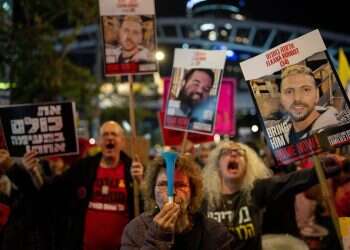Although two IDF soldiers were killed in terror attacks in less than four days, the security establishment says that the number of such attacks has actually decreased this past week. The military attributes this to its extensive countermeasures in Palestinian territories, sometimes even conducted during daytime. But the truth is undeniable – Israel is in the midst of a murderous terror wave and there is no end in sight.
Follow Israel Hayom on Facebook, Twitter, and Instagram
At this point, the security establishment takes comfort in the fact that terrorism is not widespread across the entire West Bank, but is mainly focused in Jenin and northern Samaria, areas the Palestinian Authority has lost control over, creating a vacuum that the Israeli military operates in nightly.
Another terror area is Nablus and its vicinity, where the Palestinian Authority is actually more active after the US administration exerted pressure on leader Mahmoud Abbas in recent days. In the southern West Bank, at least for the time being, the number of violent incidents is very low, partly because the PA controls the area relatively effectively.
The problem is that since the start of the year over a hundred Palestinians have been killed in clashes with the IDF, the highest number since 2015. The high death toll fuels more violence and leads to a desire for revenge. Every "successful" attack on Israelis inspires more attacks, a cycle that no one seems to be able to break.
The security establishment is considering several possible courses of action.
The first such scenario, which has been firmly ruled out by senior officials, is to launch a large-scale military operation in the West Bank similar to that of Operation Defensive Shield, which the IDF conducted in 2002 during the Second Intifada.
Many have demanded this, but what they seem to not understand is that in 2002, the IDF did not enter Palestinian cities every night, whereas it does so now. A more extensive operation given today's reality could perhaps focus on rounding up weapons or suspects, but no one wants the IDF to stay in Area A for too long.
Another possibility, which has also been ruled out by high-ranking security officials, is to increase civilian measures in Palestinian territories, such as closures and denials of work permits. The assumption is that the civilian population will understand the cost of terrorism and act to eradicate it.
But past experience shows that such measures actually increase terrorism, and bring more Palestinians into the circle of violence.
A third possible course of action, which is promoted mainly by left-wingers, is to promote the peace process.
Subscribe to Israel Hayom's daily newsletter and never miss our top stories!
Ahead of the election, Israel's response is to flood the territories with forces, arrest potential attackers based on intelligence, and put pressure on the PA to step up. Senior security officials hope that those that threaten Israel will give up at one point or another, and the terror wave will subside, as was the case in the past.
But in the meantime, even if this is the course of action chosen out of necessity, the IDF must draw lessons from the two fatal incidents this week, and the sooner it does so, the better.
Why soldiers of the Shuafat checkpoint did not react as expected when Sgt. Noa Lazar was hit, or why the soldiers of the Givati Brigade did not fire back at the passing vehicle when Staff Sgt. Ido Baruch was shot, and whether they stood in their reinforced stations at all in accordance with instructions at will all have to be investigated thoroughly.
But putting the responsibility on the soldiers alone would be erroneous and hinder efforts to prevent the next fatal attack.




